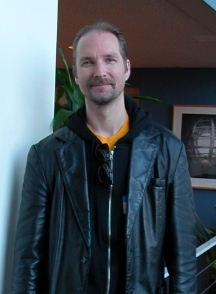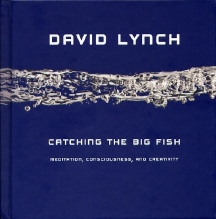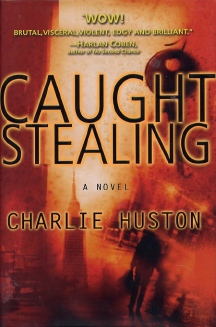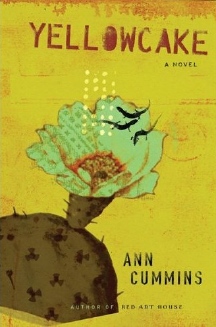Trashotron.com |
||
This Just In...News From The Agony Column
02-24-07: A Conqueror's Fantasy
Preview For Podcast of Monday February 26, 2007
Here's an MP3 preview of the Monday, February 27 podcast for The Agony Column. Enjoy!
02-23-07: Charlie Huston on the 'Already Dead' Movie
"Blood Spattered Pulp Noir"
Beyond the press release, yesterday's announcement of the film deal for Charlie Huston's novel 'Already Dead' didn't tell us a whole hell of a lot. Of course, we have in-depth no-spoiler reviews of both of the novels in the Joe Pitt Casebooks series, 'Already Dead' and 'No Dominion', as well as two reviews his first novel, 'Caught Stealing' (2004, 2007). Readers can also listen to a podcast interview with Charlie Huston from last month.
I decided to go to the source and see what the author had to say about all the film deal foofaraw, since we prefer to offer actual, author-oriented content as opposed to regurgitations of Variety magazine and screen grabs from the * database.
RK: How long has this deal been in the works?
CH: The contracts were actually signed some time back, but production companies work on their own calendar and I don't know why they held back on the press release. The real time eater was the negotiations themselves. To give you some perspective, one of the principles had time to get married, buy a new home, get pregnant, and have her baby in the time we were bringing this together. No lie.
RK: What sort of input or control do you have over the movie script? It's being written by Scott Rosenberg, I understand. Have you met with him?
CH: I have zero input. Which is as it should be. I wrote the book and sold the rights, now I shut up. Scott is a very experienced hand and will do a great job. I have met with him and he's a gent. He has some cool ideas for turning the story into a movie, and I think they're spot on.
RK: What are your hopes for the movie?
CH: That it doesn't suck. Seriously, my first wish is that they can get it made. The odds on that alone are the kind that would send professional gamblers scrambling for the hills. Assuming they can bring it to screen, I'd love for it to be a scary-ass piece of blood spattered pulp noir.
RK: Will the movie adaptation influence the forthcoming titles in the series?
CH: No.
RK: Do you think that a major motion picture studio will be willing put the sort of language and violence you use on screen? Those are, after all, one of the strengths of your work.
CH: Well, first, there's no saying who may or may not actually get behind 'Already Dead' should it become a movie. If it were a studio movie, one would assume a reduction in vulgarity. On the other hand, I think it's been well established in Hollywood that you can show no end of gore and violence, as long as you don't show too much nudity and graphic sex. I'd count on fewer fucks and a liberal amount of bloodshed.
02-22-07 : Giving Hal Duncan Some More 'Ink'; A Review of 'Catching the Big Fish' by David Lynch
Writing, Un-Writing and Rewiring
Put aside your pre-occupations, and prepare to focus your attention. Hal Duncan's 'Ink' is here to articulate the ineffable, to build with words worlds that cannot otherwise be imagined. It's not simply future this or fantasy that. Duncan operates well beyond the confines of genre fiction even as he skillfully deploys the tools of genre fiction. So you will find future this in 'Ink'. You will see fantasy that. But they're just beads on a string, words in a sentence, even though each "word" itself may consist of thousands of words. So yes, 'Ink' is a big book of Big Thinks. Only in such a form can a writer provide the sort of deep and intense reading pleasures that one will find in 'Ink'.
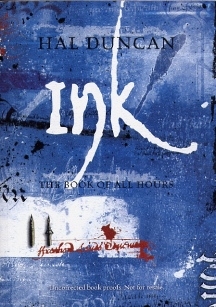
Well the edges of the book are linear.
First and foremost, one must remember that 'Ink' is part two of a novel that was published in two parts, 'The Book of All Hours'. There are probably a few smart and savvy readers out there who sat on 'Vellum' so that they could enjoy a seamless reading experience. But 'The Book of All Hours' is the sort of novel that you can read multiple times, each time offering a very different reading experience. The meandering point of this paragraph is that one should not read even consider reading 'Ink' unless one has read 'Vellum'. Duncan offers a "What Came Before" at the start of this book, which runs some 30 pages. That's generous as a writer and probably smart when you've got a Part One as complex as 'Vellum', but it most assuredly shall not replace 'Vellum'. So if you're buying this, buy 'Vellum' as well and read it first.
'Ink' completes the promise made in 'Vellum', and to a certain extent, that's all you need to know. That pact with the reader was unique, and what makes Duncan one of our most exciting authors. Duncan promised in the first novel no less than to describe reality in a manner unconstrained by previous literary conceits, and with 'Ink' unconstrained is clearly the key to your enjoyment. One observation that many writers have made of genre fiction is that all fiction is essentially a mystery, in at least that readers must read to find out what happens. Or why. But if that's true, and I think it's a good measure, then what Duncan has done with his novel is to make structure a key element in the mystery. One moment, we may be reading of 1939 Paris, and 'Ink' will seem to be a finely wrought historical novel. Another moment, we're in the Havens of Hinter, surrounded by nanotech that dissolves reality as effectively as any wizard's magic. Or performing Euripides in a medieval castle, or in the hills of Ararat, amidst the Yezidi. Beads on a string. The mystery we have the delight of solving is to enter each world and then determine how they connect and shape the Big Picture. Sort of like life, only in two big ol' books.
The remarkable feat that Duncan accomplishes is two-fold. He makes each individual world real with prose appropriate to that world; sometime rough-hewn, and sometimes silky smooth. But more importantly, he makes the textual leap from one world to the next seem natural. No, it's not easy. 'The Book of All Hours' is a page-turner all right, but in order to truly enjoy reading this book, you’re not simply going to immerse yourself. You have to become an active participant, putting the book together in your mind to build a glimpse of Duncan's three dimensional map of time where what could have been might divert and flow into what is at the whim of a rent in reality created by runaway technology, or hidebound magic.
Duncan is as free with his literary techniques, his mash up of every damn thing, as his characters in their nanotech-deconstructed future are. Are you reading Thomas Pynchon's 'Against the Day'? Then you'd be well advised to pick up 'Vellum' and 'Ink'. To my mind this is a heady literary dessert, though readers who prefer a linear story told in a linear manner will almost certainly find the novel difficult and convoluted. But if you're looking for the sort of novel that you find yourself forced to think about even when you’re not reading it, if you read in order to create your world, then this, my friends is the sort of reading that will reward you with riches beyond avarice. Future this. Fantasy that.
Big Thoughts in a Small Book
David Lynch is probably the appropriate companion for Hal Duncan I could possibly summon. Lynch's dissolute view of reality is not so dissimilar from Hal Duncan's literary reality-hopping. Lynch's book, 'Catching the Big Fish: Meditation Consciousness and Creativity', on the other hand is the polar opposite, a series of short, pithy meditations on things that interest Lynch, in particular, how Transcendental Meditation has helped him rope in the odd underpinnings of his deliberately obscure art. Readers who want to hear the man speak directly on his art are recommended to read 'Lynch on Lynch' (Faber & Faber ; 1997 ; $16), edited by Chris Rodley. That's the book for serious film geeks. On the other hand, Lynch's own book is filled with some intriguing thoughts about film, about the director and his work and even about Denny's. You've heard him talk about some of this in the interview I did; if you enjoyed that, you'll like this book. Here's the review of 'Catching the Big Fish: Meditation Consciousness and Creativity' by David Lynch. Please stand by while the reality around you melts at no extra charge.
02-21-07: John Scalzi Unlocks 'The Sagan Diary'; A Review of Charlie Huston's 'Caught Stealing'
What Girls Think
Do not ask questions to which you do not wish to hear the answers.
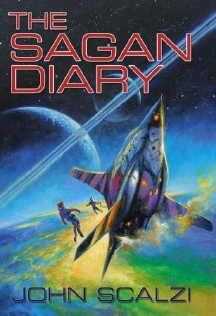
Cover artist Bob Eggleton enters a new Golden Age.
But, having done so, here are the answers you'll get out of me.
John Scalzi strolled from Blog King into the publishing world with a little novel titled 'Old Man's War' that basically blew a lot of readers' minds, with good reason. Remember that visceral jolt you felt when you first got your hands on a good spaceship shoot-'em-up? Whether it was 'Red Planet' by Robert Heinlein, 'Dune' by Frank Herbert, heck even Star Wars. You can tell I'm serious, I dare mention it by name.
Well, that was the jolt that John Scalzi provided. He took the most basic, appealing elements of science fiction, stripped 'em down, shined 'em up, executed them flawlessly, then put the pedal to the metal. But up until now it was just he. He being, in this case, John Perry. Move over John; John is being kind enough to offer us the perspective on your tales from a different vantage point, from a rather different set of eyes.
'The Sagan Diary' (Subterranean Press ; February 10, 2007 ; $20) is a must-have book for just about any serious reader of science fiction and certainly for any serious collector of science fiction. It's a gorgeous little hardcover with a golden-age worthy cover by no less than Bob Eggleton, and B&W interior B&W illustrations as well. The title should tell readers of Scalzi's first two novels everything they want to know about this novella. It recounts some of the action from those novels from the point of view of Jane Sagan, who shall we say, isn’t always on the same page as Perry.
Since Scalzi has started at the top, it's certain that this novella will sell out and become a costly collector's item not too far down the line. But forget all that. At a mere $20, for an illustrated hardcover novella of 90 pages, it's a steal, a perfect rainy day reading experience. Scalzi provides the sort of big-screen thrills on the printed that the big screen just does not and to a certain extent, cannot offer. Closely observed, gripping characters blow big shit up in space. 'The Sagan Diary' clues you in on what girls think about this. Whatever your expectations are, you might as well hook 'em up to the big shit being blown up in space.
Caught Human
I think that Terry D'Auray's review of Charlie Huston's 'Caught Stealing' is one of the best reviews on this site. It was with some trepidation that I even undertook to review the book myself, but I made a pledge to myself a while back to review everything I read, period, if for no other treason than to get practice writing reviews. But I have the perfect excuse, I told myself earlier this morning. Terry did a perfect job.
Well, fuck that, as Hank Thompson might say. Perfect as the review is, I did manage to recall that I had a rather different take on the oeuvre of one Charlie Huston, having come to it via 'Already Dead' and 'No Dominion'.
And given that, the review pretty much wrote itself. Now for those who are offended by what is euphemistically called "the eff word" (that is, the word FUCK!), then perhaps you'll choose to sit this one out. Have a glass of lemonade on the porch while I work out my own demons.
The demons I'm trying to exercise (not exorcise, I like my demons and intend to hang on to them so long as they aren't bored shitless by my reading lifestyle) are the very beings that aid me in enjoying such droll material as the work of Mr. Huston. See that baseball bat? I can laugh. You touch that sumbitch and well, the deal's off. I hope that you enjoy this review of 'Caught Stealing'. It ain't perfect. But I do use the word fuck a lot, and that makes it better, right?
02-20-07: Savor the Moments
A Review of 'Ysabel' by Guy Gavriel Kay
I wasn't very far into my sticky note obsessive reading of Guy Gavriel Kay's latest novel 'Ysabel' when I began to think that I should have some sort of personal best-seller should-be list for this site. 'Ysabel ' is the sort of novel that you want to tell everyone you know about, to see reviewed in your local paper, to see your kid bring home from school as a reading assignment. Not because you think it needs to be assigned, but because it's the kind of book that can create a life-long love of reading. 'Ysabel' would be number one on my bestseller list this week, and for many thereafter.
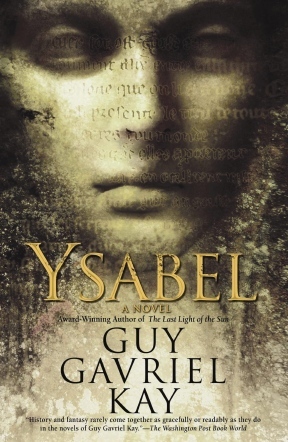
Classy cover, nice design. Better to read than to look at, though!
The wide appeal of 'Ysabel' is more powerful because it is achieved by virtue of the book being well-written, not because the book is written to appeal to a big audience. 'Ysabel' is a novel of history so powerful that the past pervades the present in a manner that one might be tempted to call supernatural, were it not rendered with the sort of conviction that forces one to set aside such considerations. And when events themselves bring the characters to this point, the discussion is precisely what you might expect from reasonable humans confronting unreasonable circumstances. What the heck. Deal with it.
Suffice it to say that with two movies based on his work in the hopper, and an incredibly enjoyable novel on the shelves, Kay is well past the point of being a hot commodity. He's currently writing the screenplay for 'The Last Light of the Sun'. Here's the review of 'Ysabel'. Find this novel while you can. Buy a couple of copies, as one will most assuredly be spending time away from you. And time, you will learn, is of the essence.
02-19-07: Where the Dust Settles
A 2007 Interview with Ann Cummins by Kathryn PetruccelliKUSP's Kathryn Petruccelli had a chance to speak with the talented Ann Cummins last week about Cummins' new and first novel, 'Yellowcake' ( Houghton Mifflin ; March 15, 2007 ; $24). Cummins is the talented author of 'Red Ant House' a short story collection from 2003 that earned lots of praise and was on many year's best lists. 'Yellowcake; is the story of two families, one Navajo, one Anglo, some thirty years after they worked together in the uranium mines of the American Southwest.
It's familiar territory for Cummins; her family moved from County Galway, Ireland to Colorado, where they mined silver, coal and uranium. When she was nine, her father moved the family again, to Shiprock, New Mexico, in the northern part of a Navajo Reservation. Clearly, you can see where this novel is coming from and it's very close to a home that is intimately connected with The End Of The World As We Know It. Our friend, the Nuclear Apocalypse hangs heavy over this book as does all the fallout, both literal and literary. You can download the MP3 of the interview and distribute it like yellow dust on the wind, or the RealAudio for the "AM talk radio sound" that just can't be duplicated out side of a moving automobile. Enjoy Kathryn's conversation with Cummins, while you wait for the end of the world.
